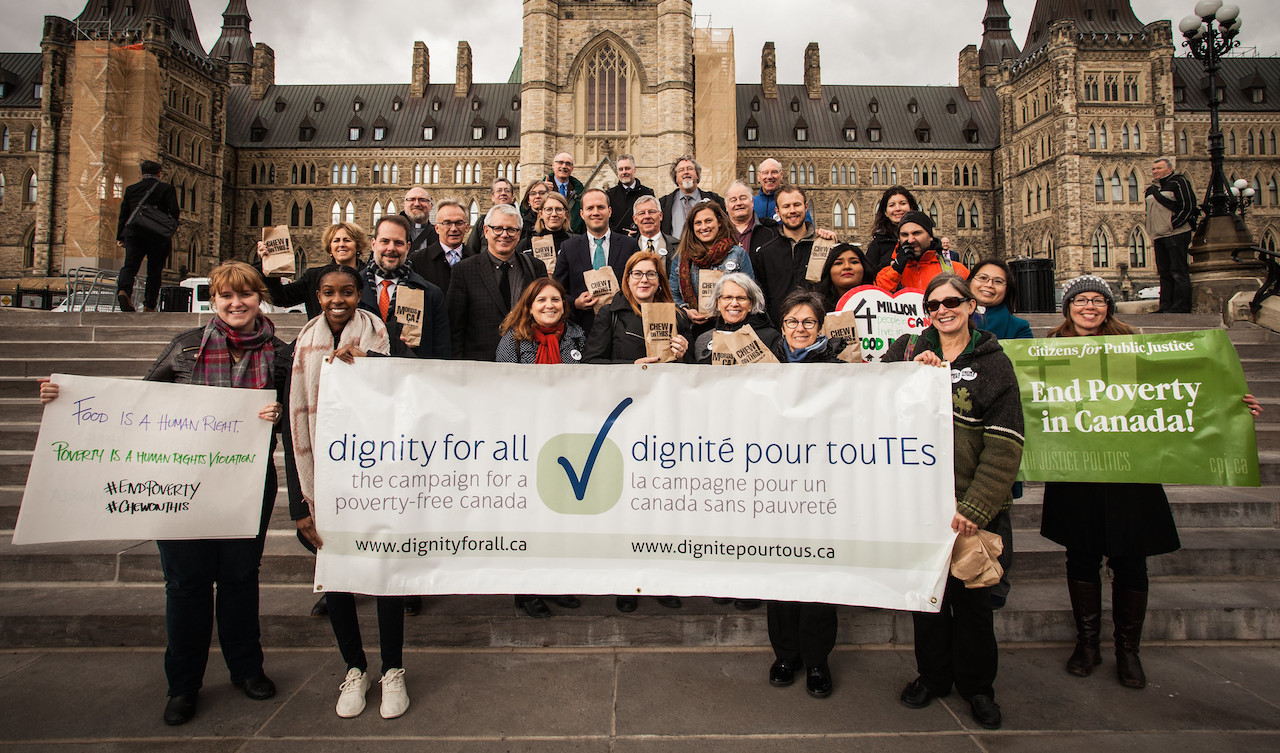What does it mean to say we want to end poverty in Canada? More than an act of charity, this is a question of basic rights.
Poverty forces people to make impossible choices about which of their basic needs will be met each day. Beyond just material deprivation, poverty seeds social exclusion that undermines people’s sense of dignity and self-determination. And as a country, Canada has signed several international human rights treaties, including the International Covenant on Economic Social, Cultural Rights, that guarantee these rights to all people in Canada. But whether you understand international human rights law or not, a lack of access to food, shelter or clean drinking water in a country as wealthy as Canada is shameful.
Whether you are directly or indirectly impacted, poverty affects us all. Approximately 4.9 million people in Canada are living in poverty, despite our country having one of the highest Gross Domestic Products (GDP) in the world. Over four million households in Canada cannot afford to put nutritious food on the table and the numbers are even higher in Nunavut where it is estimated 70 per cent of Inuit preschoolers live in food insecure households.
In addition to the human cost, the impacts of poverty are felt throughout the country. Poverty puts exorbitant strain on our health-care and criminal justice systems, among others. A recent report estimates that poverty costs $33 billion annually in Ontario alone. Meanwhile, shelters are beyond capacity due to a rising housing crisis, and food insecurity is climbing, with 1.1 million Canadians accessing food bank services every month. They need a concrete commitment and immediate action.
As valuable as emergency services are, we will not end poverty with charity. We need ambitious, systemic change that frames poverty as a matter of rights and justice.
The upcoming federal election means once again voters will decide the future of this country. And with democracy in full swing, headlines about the rising cost of living, changes to the labour market, and the need for a just transition to a green economy means we must also take this opportunity to chart a new way forward, ensuring no one is left behind.
In August of 2018, the federal government released its first-ever federal poverty-reduction strategy entitled Opportunity for All. The strategy introduced an official poverty line and the National Advisory Council on Poverty. However, the announcement last summer was largely a review of measures the government had already introduced over the course of their mandate.
Despite taking some important first steps, the poverty-reduction strategy could hardly be described as the implementation of a comprehensive, fully funded, rights-based plan to end poverty many have been calling for. For one, the goal of the current strategy stops at reducing poverty by 50 per cent by 2030, barely squeaking in above the lowest target possible to meet Canada’s commitment to the United Nation’s first sustainable development goal of ending poverty. So, this begs the question — is this an opportunity for all, or an opportunity for some?
By committing to reduce poverty and not eradicate it, Canada is signalling that it is satisfied with helping some people escape the cycle of poverty, while others stay trapped in the cracks of inadequate, piecemeal programs.
Reducing poverty by 50 per cent is simply not enough. We need to recognize and eliminate the systemic barriers that create and prolong poverty.
The reality is that Canada’s current poverty-reduction strategy just scratches the surface of the work still to be done. We are here and eagerly awaiting more ambitious commitments, including collaboration with Indigenous, provincial, territorial, and municipal governments.
This October 17, Chew on This! organizers from across the country will take to the streets, school hallways, places of worship and, yes, Parliament Hill, to call for ambitious action towards a poverty-free Canada. Thanks to growing support over the past seven years, what began as a small movement of 13 organizations has now grown into Canada’s largest national anti-poverty campaign spanning from St. John’s, to Iqaluit, to Victoria. This year, over 100 groups from communities, high schools, universities, faith-based groups, and anti-poverty and non-profit organizations in every province and territory will be inviting members of their communities and elected officials to sign postcards calling for bold, significant, and immediate action to be taken to end poverty in Canada.
The Chew on This! campaign stands in solidarity with the millions among us living in poverty. It’s time for the Government of Canada to stand with us. We need all party leaders to bring issues of poverty, housing, and food insecurity to the forefront. The time is now to commit to more than merely reducing poverty in Canada. This election, let’s vote to end poverty.
Visit www.chewonthis.ca to learn more.
Alexandra Zannis is the project and outreach coordinator at Canada Without Poverty.
Image: Jim McIntyre from Citizens for Public Justice via United Church/Flickr




